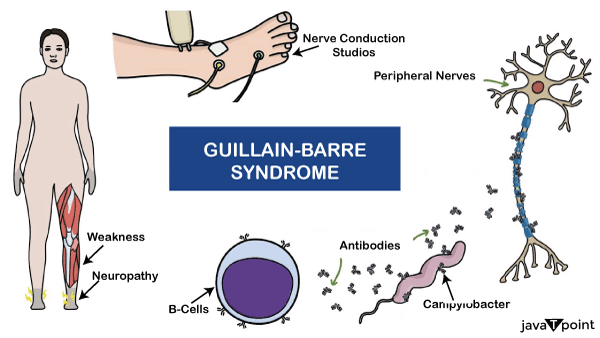Guillain-Barré syndromeThe immune system of the body attacks a portion of the peripheral nerve system in Guillain-Barré syndrome. The disease has the potential to harm nerves that control muscular activity as well as those that carry pain, temperature, and touch sensations. This can cause muscle weakness, loss of sensation in the legs and/or arms, as well as difficulty eating and breathing. It is a rare disorder that can affect people of all ages, but it is more common in adults and men. 
SymptomsSymptoms usually last a few weeks, and most people recover without any long-term, severe neurological consequences. Weakness or tingling feelings are the early signs of Guillain-Barré syndrome. They usually begin in the legs and work their way up to the arms and face. In some people, these symptoms can result in paralysis of the legs, arms, or face muscles. The chest muscles are compromised in roughly one-third of patients, making breathing difficult. In severe forms of Guillain-Barré syndrome, the ability to talk and swallow may be impaired. Because these are life-threatening circumstances, patients should be treated in intensive care units. Even in the most severe cases of Guillain-Barré syndrome, most people recover completely, however some people continue to have weakness. Even under ideal conditions, a tiny number of Guillain-Barré syndrome patients die from complications such as respiratory muscle paralysis, blood infection, lung clots, or cardiac arrest. CausesGuillain-Barré syndrome (GBS) is a very uncommon disorder. Although the specific cause is unknown, most occurrences are the result of a virus or bacterial infection. As a result, the immune system can do a attack on the body. One of the most common risk factors for GBS is infection with the bacteria Campylobacter jejuni, which causes gastroenteritis (nausea, vomiting, and diarrhoea). GBS can also develop as a result of the flu or other viral illnesses such as cytomegalovirus, Epstein-Barr virus, or the Zika virus. Vaccinations may raise the risk of people contracting GBS in rare cases, but the likelihood of this happening is extremely low. According to research, people are significantly more likely to get GBS through diseases like the flu than from the vaccine aimed to prevent infection, in this case the flu vaccine. Surgery can occasionally cause GBS. DiagnosisThe diagnosis is based on symptoms and neurological examination results, such as decreased or absent deep-tendon reflexes. A lumbar puncture or electromyography (EMG) may be performed for informational purposes but should not be used to delay treatment. Other investigations, such as blood testing to detect the underlying cause, are not required for GBS diagnosis and should not be postponed. Anyone suspected of having GBS should be regularly examined for respiratory problems. Treatment and CareThe following are therapy and care guidelines for patients with Guillain-Barré syndrome:
WHO ResponseWHO assists nations in managing GBS by:
The World Health Organization's Intersectoral Global Action Plan on Epilepsy and Other Neurological Disorders aims to address the barriers and gaps in providing treatment and services for people with neurological problems like GBS, as well as to provide a comprehensive, coordinated response across sectors. Key Facts
Guillain-Barré syndrome patients should be treated and monitored as soon as feasible; some may require urgent care. Supportive care and immunological treatments are used in treatment.
Next TopicHuntington's Disease
|
 For Videos Join Our Youtube Channel: Join Now
For Videos Join Our Youtube Channel: Join Now
Feedback
- Send your Feedback to [email protected]
Help Others, Please Share









